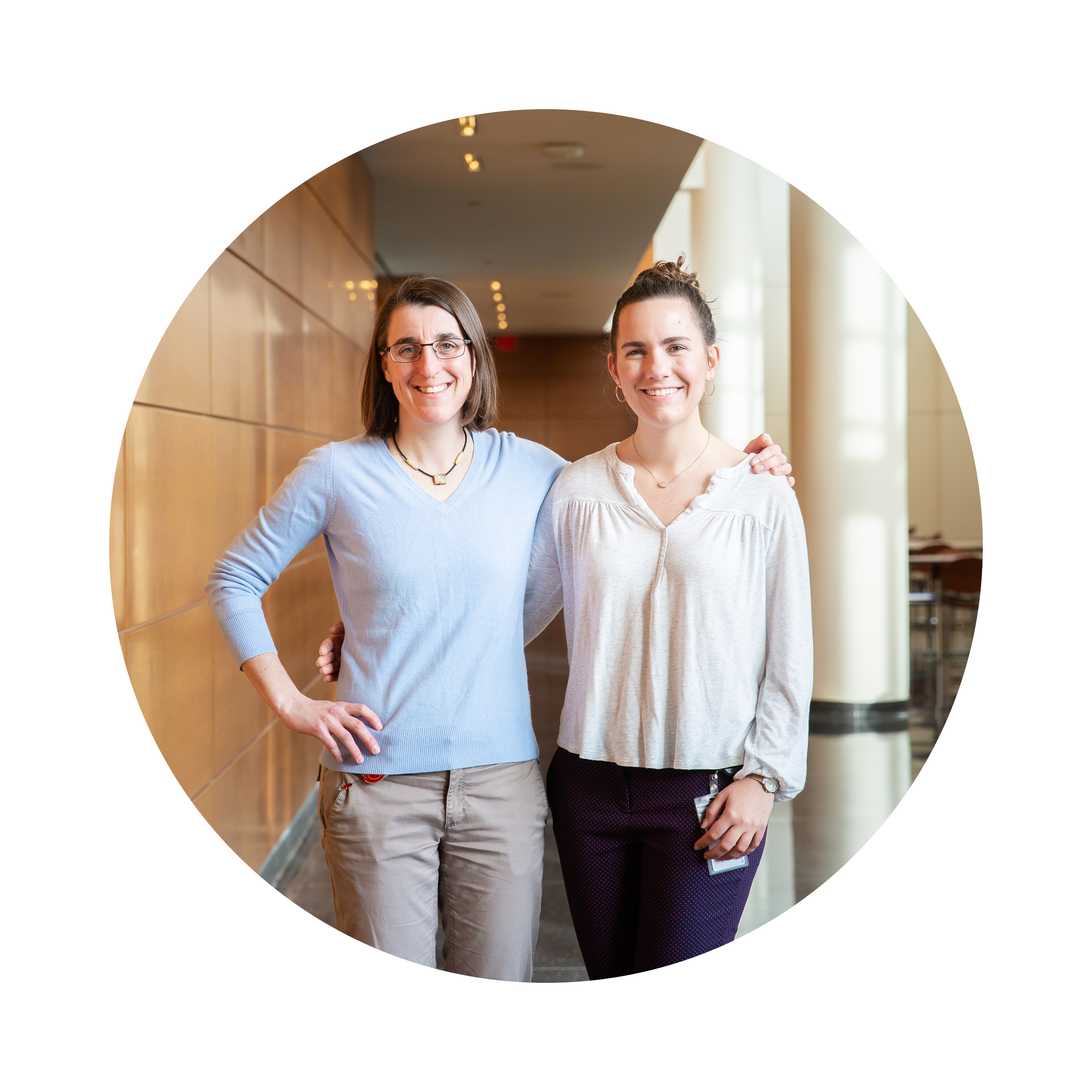Climate & Health
- Climate and Health Home
- About Us
- Climate and Health in Minnesota
- Agriculture and Food Security
- Air Quality
- Diseases Spread by Ticks and Mosquitoes
- Extreme Heat
- Planning for and Responding to Extreme Heat
- Water Changes
- Wellbeing
Resources
- Discussing Climate Change with Patients
- Minnesota Outdoor Air Quality Guidance for Schools and Child Care
- Climate and Health Stories
- Planning Tools and Publications
- Trainings and Resources
Related Topics
Environmental Health Division
Climate and Health Stories: Ellen Pillsbury and Elizabeth Bina
Meet Ellen Pillsbury and Elizabeth Bina.

Ellen is an active transportation coordinator with our Statewide Health Improvement Partnership. Her work focuses on transportation and land use planning to increase opportunities for walking and biking in communities such as walking or biking to work.
Elizabeth is a public health associate with our Statewide Health Improvement Partnership. Her work combines active transportation with food access—connecting Minnesotans with resources for safe, healthy, and affordable food.
What most excites you about your work?
Ellen: I’m most excited about helping people have safe options to walk, bike, and take public transit. Walking is one of the most foundational activities for active transportation—making it safe and accessible for everyone helps us advance health equity.
Elizabeth: I’m most excited about connecting folks to the resources we know they want and desire, but don’t always know are available to them. We want to shift away from looking at healthy eating as an individual behavior and explore the other factors that impact people’s ability to choose safe and healthy foods.
How is your program preparing for and/or responding to climate changes in Minnesota?
Ellen: We know biking and walking are the most sustainable options for transportation—both reducing greenhouse gas emissions. Minnesota Walks is our statewide framework for creating safe, walkable communities for Minnesotans. This framework includes planning and design strategies for improving year-round access for biking and walking.
Elizabeth: We work with the Minnesota Food Charter to guide policymakers and community leaders in providing equal access to affordable, safe, and healthy food options. The Minnesota Food Charter promotes environmentally-friendly solutions, such as sustainable agricultural practices.
Why do you think it’s important for MDH to be working on this issue?
Ellen: How can we not work on this issue? In public health, we work to prevent people from getting sick or injured. With our climate changing, we need to think about how folks spending time outdoors will be impacted. If we ask people to walk outside, we need to ensure that they are able to do so in their environment.
Elizabeth: We support our local farmers and encourage Minnesotans to shop locally for fresh and sustainable produce options. With plant hardiness zones shifting (which plants are most likely to thrive at a given location), this can have huge impacts on the success and livelihoods of farmers. It’s important that we maintain our ability to grow healthy and nutritious food here in Minnesota.
How has climate change impacted your life personally?
Ellen: I grew up in Vermont and have been flying home for the holidays for over 20 years now. They used to be harrowing trips, flying into small regional airports during snowstorms. Over the past decade, there’s been less and less snow. We aren’t always able to go skiing as a family. We are losing that tradition of coming home for a white Christmas.
Elizabeth: Recently, I was talking with a relative at a family gathering. They mentioned that they don’t believe in climate change. After talking about the issue, we both came to the conclusion that activities like recycling are positive for people and our planet, regardless of your stance on the issue. We were able to find common ground on positive solutions together. While it is so important for me to maintain my family relationships, it’s still necessary to have these conversations—they can make such a big impact.
How has integrating climate change into your work allowed you to collaborate with programs you normally wouldn’t?
Ellen: Joining the MDH Climate & Health Workgroup planted the seed for thinking about climate and health issues in our State. We have learned a lot of the background and are now able to bring the conversation into our own topic area.
Elizabeth: For example, we have been able to find ways to incorporate climate change in the local comprehensive planning process. Now there is a “Resilience” chapter that provides resources for communities to integrate strategies into local comprehensive plans so they can be more resilient in the face of climate change.
What do you think are the biggest opportunities for climate and health moving forward?
Ellen: Climate change is a healthy equity issue - some people will be more affected than others. Lots of people are working on this issue. It’s important that we connect with other states and share strategies. There are so many opportunities to explore with local planning and active transportation.
Elizabeth: Food waste is a huge issue in our country. Up to 40% of food in the United States goes to landfills, which is unsustainable and contributes to greenhouse gas emissions. Our food system needs to change—we need to redirect this food to people who don’t currently have access to healthy and affordable food options.